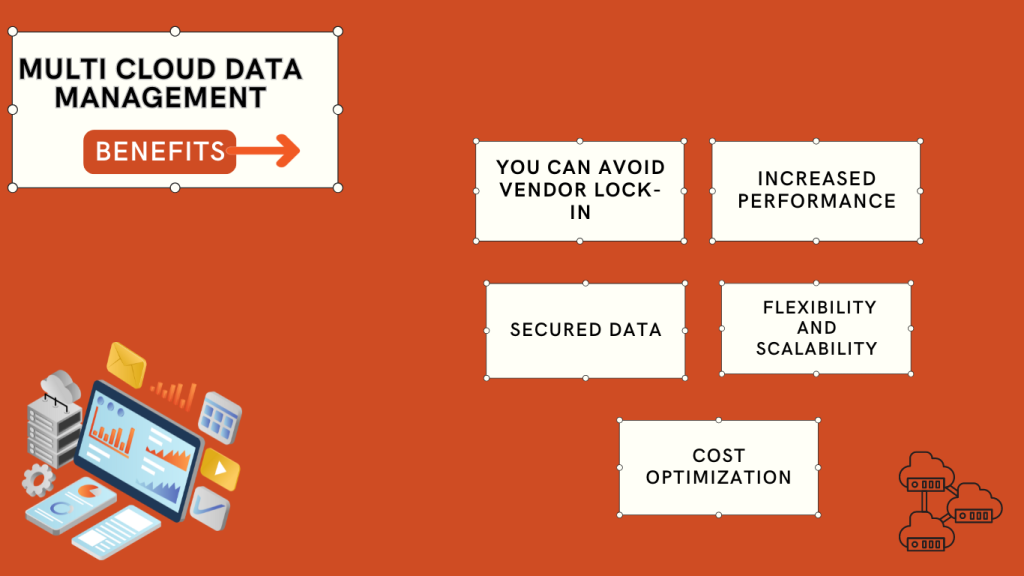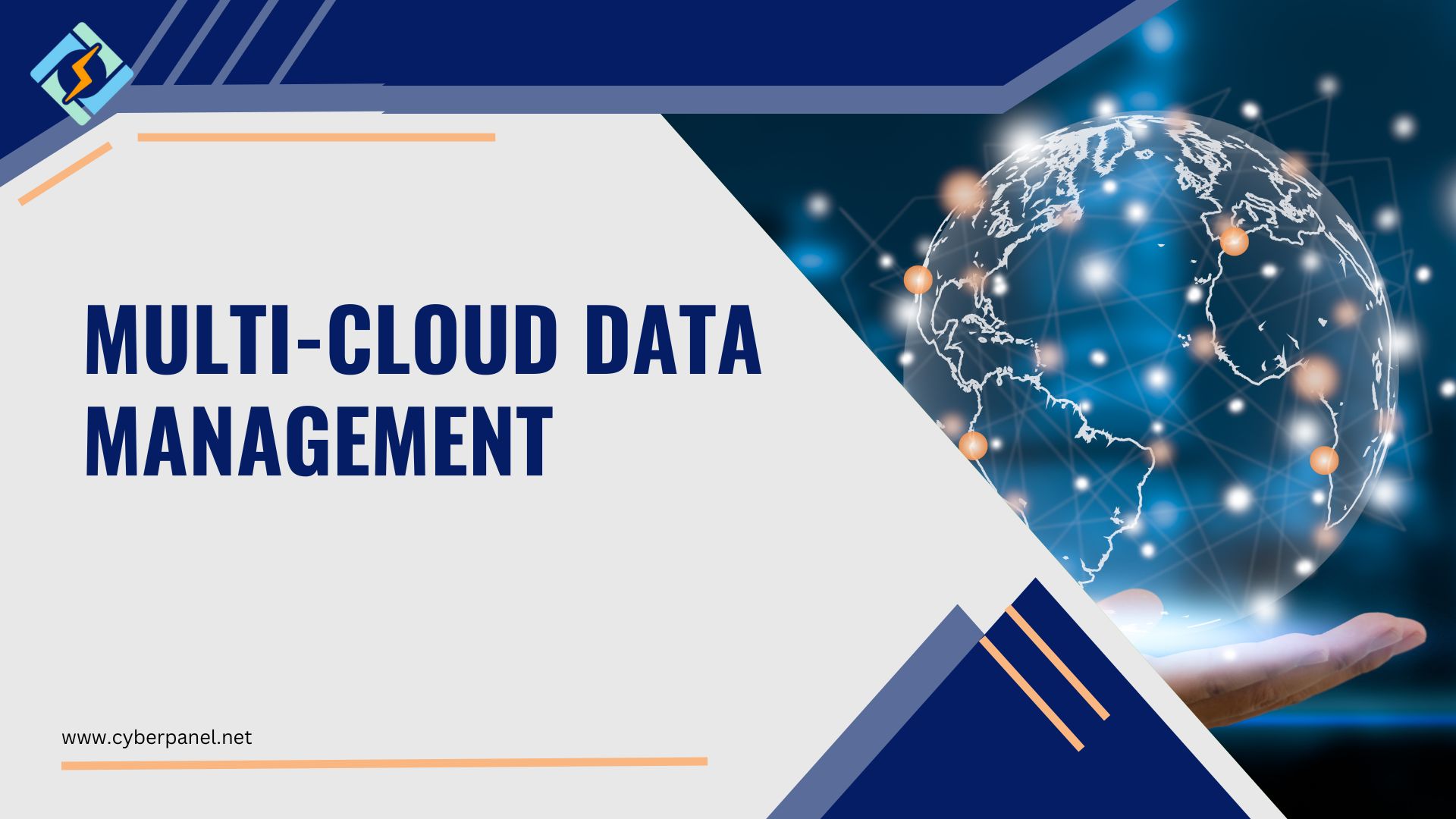From streaming music, and a movie, to ride-sharing apps like Uber, as you enjoy online banking, and uploading content on your social media platforms as a digital marketer, multi cloud data management is the behind-the-scenes hero, ensuring that your data is securely stored, processed, and retrieved efficiently across multiple cloud systems, ultimately guaranteeing reliability, secure access to our files.
Multi-cloud data management is becoming increasingly common among businesses as a way to reduce costs, avoid vendor lock-in, and improve flexibility.
Everything you need to know about multi cloud environments—their advantages, difficulties, best practices, and upcoming trends—will be covered in this article.
Introduction to Multi Cloud Data Management
Basic idea about What is Multi Cloud?
A multi cloud consists of multiple on-premises data centers and public clouds together. It allows businesses to choose the finest features from each cloud provider to suit their unique requirements.
Multi-cloud only uses different public cloud services, as opposed to hybrid cloud, which mixes private and public clouds and is also referred to as the subset of multi-cloud.
Get exclusive access to all things tech-savvy, and be the first to receive
the latest updates directly in your inbox.
What is Multi Cloud Data Management?
A systematic approach to managing data across multiple cloud environments, multi cloud data management provides enterprises with enhanced security, cost savings, and flexibility. Workloads are distributed, vendor lock-in is avoided, and data security is improved with this technique.
Also processes and stores across multiple cloud environments from different providers, like a few popular ones are AWS, Google Cloud, and Azure.
For example, a business may use Amazon Web Services (AWS) for certain tasks and Google Cloud Platform (GCP) for others. Some companies may even simultaneously use GCP and AWS, two public clouds.
Key Benefits of Multi Cloud Data Management

Let’s look into some key benefits of multi cloud data management for your IT needs.
1. You can Avoid Vendor Lock-in
A key benefit of multi cloud data management is the ability to avoid vendor lock-in. How it is done is by distributing workloads over various cloud providers so businesses can negotiate better terms and prices with suppliers and switch providers if necessary because they are not restricted to a single cloud provider.
Also can lower the risk of service interruptions or provider strategy changes by not relying on a single provider’s technology.
This approach leverages several specialized services and minimizes dependency on a single provider for all software needs, a multi-cloud app strategy enables enterprises to implement the newest, best solutions.
2. Enhanced Flexibility and Scalability
Multi-cloud systems provide unmatched scalability and flexibility. Businesses can scale their resources up or down in response to demand and select the cloud services that best suit their unique requirements.
Companies can effectively manage their data and apps across a variety of environments thanks to this versatility.
3. Increased Performance
The capability of distributing apps and services geographically is another obvious advantage of a multi-cloud strategy. This regional dispersion helps to provide optimal performance and an enhanced user experience when a company selects a cloud provider with data centers near their consumers or business users which reduces latency and other performance difficulties.

4: Cost Optimization
Effective cost management is a key benefit of multi cloud data management. When organizations choose cost-effective cloud services that manage their workloads, it ultimately reduces the overall cloud expenditure. Organizations can advantage of competitive pricing models and prevent overspending on services by utilizing multi-cloud environments.
5. Data Security
One of the major concerns in a multi cloud data management environment is security. Organizations often strengthen their defenses with solutions like Netenrich Managed Detection and Response (MDR)
, which delivers continuous monitoring, advanced threat detection, and automated response across complex, multi-cloud infrastructures.
Challenges and Considerations in Multi Cloud Data Management
Nothing comes without challenges in the digital world, some of the multi cloud data management challenges are listed below.
Complexity Issues
Architecture and operations become more complex when managing several cloud platforms and providers. Managing various interfaces, standards, and procedures exclusive to each cloud provider is the source of this complexity.
Maintaining a cohesive and effective multi cloud data management structure operating in these different locations is a challenge that calls for serious planning and coordination.
Security Concerns
Data privacy, safe platform connections, and preventing operational delays caused by security measures are all issues that organizations need to manage
It can be an additional stressful task for the organization to look after the safety issues across multiple cloud management environments, where an organization uses multiple cloud computing services, involving several layers and aspects such as:
- Data privacy: guaranteeing that only authorized individuals can access and view data across various cloud services.
- Securing Connections: Making sure that only approved traffic is allowed over secure connections between various platforms.
- Preventing Operational Bottlenecks: Putting security measures in place shouldn’t make daily tasks more difficult. Workflow shouldn’t be restricted by constant security regulations.
Costs
Another key multi cloud data management complication is cost. It might be difficult to manage and optimize expenditures across several cloud platforms because of different price structures and additional expenses.
Also, cost prediction can be challenging when dealing with flexible charging models, particularly if you don’t have a clear idea of which users will be utilizing certain resources and systems. Businesses must use multi cloud strategies to efficiently manage and control expenses across a range of cloud platforms.
Inefficient Vendor Tools
The present tech market is flooded with cloud management tools. Managing Multi cloud data is challenging as it’s hard to locate technologies that offer the necessary advantage when using a multi cloud approach.
Users can select from a variety of tools to give them an advantage over rivals but finding such comprehensive multi cloud data management tools is very hard. This isn’t quite clear-cut, though, as many programs have restricted functionality and are platform-specific.
To make sure they meet their needs, organizations must carefully assess the technologies they use.
Integration challenges
Another challenge is managing data and processes across several cloud platforms. Integrating various clouds helps prevent them from operating as separate compartments but rather as a single unit. It necessitates the purposeful deployment of applications across many multi cloud environments and data management.
Top 5 Tools and Platforms to Simplify Multi Cloud Data Management
Without proper tools, businesses can’t manage multi cloud data, we’ll talk about which tools are available that organizations are using to get help and overcome the obstacles faced by multi cloud data management. But before that:
Some key features to look at before selecting a multi cloud data management platform
- Automation: Simplifies processes by lowering the amount of manual labor and error-proneness.
- Capabilities for managing costs: Crucial for controlling cloud costs.
- Security precautions: Guarantee data security and adherence to legal requirements.
- Options for customization: Let companies modify the platform to meet their requirements.
- Simplicity of usage: Effective management requires an interface that is easy to use.
- Scalability: The ability to adapt to changing needs and corporate expansion.
You can explore the five platforms and technologies listed below:
1. Platforms for multi cloud data management
By providing a single interface for controlling several cloud environments, these technologies streamline operations across various cloud infrastructures.
- VMware CloudHealth: A comprehensive platform that provides data on cost, performance, security, and consumption in different cloud environments.
- IBM Multicloud Manager: is a central platform that offers central oversight and management of apps and data distributed across several clouds.
- Morpheus Data: A platform providing self-service resource management and cost analytics for hybrid and cloud environments.
2. Security and Compliance Tools
Verify compliance with legal and security requirements.
- HashiCorp Vault: Cloud access management, or HashiCorp Vault, safeguards private information in cloud environments.
- Palo Alto Networks Prisma Cloud: Threat detection and access control are features offered by Palo Alto Networks Prisma Cloud.
3. Tools for Monitoring and Analytics
- Datadog: A platform for analytics and cloud monitoring that provides visibility into the infrastructure and performance of applications across several clouds.
- New Relic: An observability platform that tracks infrastructure and apps and offers performance and user experience insights in multi cloud environments.
4. Container management and orchestration
Crucial for overseeing apps that are containerized.
5. Infrastructure as Code (IaC) tools
Infrastructure as Code (IaC) solutions automate the provisioning and management of cloud resources.
6. Cloud Data management tools
Provide efficient data storage and administration.
Ensuring a Strong Multi Cloud Data Management Strategy
1. Setting clear goals: Determine business needs and objectives, KPIs, and make the best use of public clouds. Determine which workloads taking into account security, scalability, compliance, and performance—benefit the most from multi cloud computing.
2. Seek Interoperability: Verify if systems can easily integrate and are compatible with industry-standard APIs and protocols. Data transfer, centralized management, workload portability, and efficient operations are all made possible by this.
3. Put into Practice a Complete Architecture Design: Build a well-architected multi cloud architecture with load balancing, redundancy, and scalability in mind while making your multi cloud decision.
4. Seek for Robust Governance and Security: To preserve control and visibility across several clouds, put in place strong governance and security procedures.
5. Take into account a common cloud management platform, which can: Simplify multi cloud data management operations and offer centralized control across various clouds.
6. Monitoring and Optimization: Leverage monitoring and analytics technologies to continuously improve productivity and efficiency.
Real-World Examples of Successful Multi Cloud Data Management Implementations
Multi cloud data management strategies are increasingly utilized by numerous companies today, with improvements continuously made to ensure future scalability, enabling significant profits for a few organizations.
- Netflix: Uses AWS in its cloud infrastructure delivering global streaming services worldwide.
- Airbnb: This platform combines public and private clouds to maximize scalability by storing and securing user data.
- BMW Group: employs AWS, Azure, and GCP to support various applications and digital transformation projects.
- Nike: Uses multi cloud data management supply chain operations for increased efficiency and improves consumer experiences by leveraging data analytics and personalization across several cloud platforms.
- Shell: Uses multi-cloud strategies, and can leverage cloud computing and data analytics to promote innovation, sustainability, and efficiency in the energy industry.
Final Thoughts: What The Multi-Cloud Future Holds
How businesses manage their IT infrastructure is being revolutionized by multi cloud data management. Businesses can save expenses, prevent vendor lock-in, improve flexibility and scalability, and guarantee strong security by utilizing a variety of cloud providers.
In this article, I have kept it concise and explained why adopting a multi-cloud approach will be essential for maintaining competitiveness and reaching operational excellence as the digital landscape changes, also explored potential challenges, use cases, and mentioned the top 5 tools that help organizations integrate multi cloud data management into their IT infrastructures.
What is multi cloud data management?
Multi cloud data management involves using multiple cloud service providers to store, manage, and process data. This approach reduces reliance on a single provider, increasing data security, and enhancing performance.
What Are the Key Benefits of multi cloud data management?
The key benefits of multi-cloud data management include:
Avoid Vendor Lock-in, Improved Flexibility and Scalability, Enhanced Security and Compliance, Cost Optimization, and overall increased Performance.
What Tools Are Used for multi cloud data management?
VMware CloudHealth, IBM Multicloud Manager, HashiCorp Vault, Palo Alto Networks Prisma Cloud, Datadog, New Relic, and Morpheus Data are some of the useful tools for multi cloud data management.



